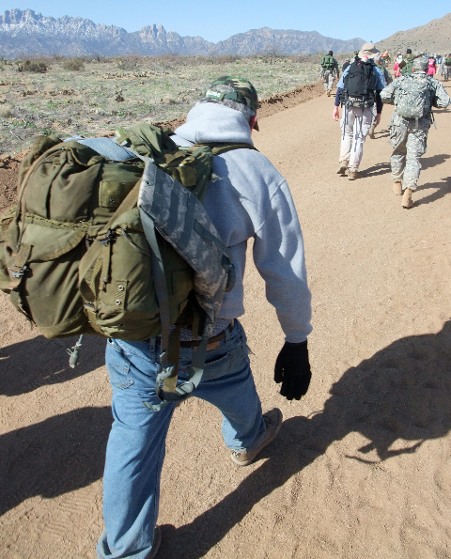45 Pounds Sure is Heavier Nowadays
This Sunday, as my buddy Paul McCloskey, editor of <a href=http://govhealthit.com/>Government Health IT</a>, and I passed mile marker six on the <a href=http://whatsbrewin.nextgov.com/2010/03/touched_by_history.php>Bataan Memorial Death March</a> we passed a young soldier toting an enormous rucksack, who was limping and favoring his left leg.

Bob carrying a 45-pound pack
This Sunday, as my buddy Paul McCloskey, editor of Government Health IT , and I passed mile marker six on the Bataan Memorial Death March at White Sands Missile Range in New Mexico we passed a young soldier toting an enormous rucksack. He was limping, favoring his left leg.
I asked him how he was doing, and like any 19-year-old trooper, he, of course, told me he had no problem -- limp notwithstanding.
Paul and I marched on for about 50 yards, when my Marine training to never leave a wounded comrade behind clicked in. I told Paul I had to go back and help. I suggested to the young soldier, who told me his name was Alex, that I carry his pack until we come to the next aid station. If he didn't let me take his pack, I told him, he could cause more damage to his ankle.
Alex, who told me that he serves in the Indiana National Guard and is a freshman at Purdue University, at first hesitated, but then relented, and gave me his pack.
Paul helped me put the pack on -- and I almost fell under the weight. Even though the rules for the "heavy" division on the Memorial March requires a 35-pound load, my 19-year-old pal had decided to tote 45 pounds. It seems Alex packed water and food that he planned to consume, and he did not want to come in light at the finish line.
Now, I used to carry a 43-pound AN/PRC-41 ground-to-air radio when I, too, was 19 years old and serving in Vietnam. But Alex's 45-pound load sure seemed heavier than I remembered.
When we finally made it to the aid station, I dropped the pack and turned Alex over to a field nurse. She suggested I take a break, which I did. I then went back to check on Alex. The nurse told me he had decided to continue the march, which meant he and I would part ways because Alex was walking the 26.2 mile route and I was on the 15 mile trail. The two routes split at this aid station.
I told the nurse I was concerned about Alex, as I was once young, macho and stupid. The nurse told me that, based on her observation, I had managed to overcome the young part in that equation.
The whole experience with Alex reinforced the key reason I have done the Memorial March the past two years: It's not about winning; it's about the true camaraderie that comes from a shared, tough experience with 5,000 other folks that honors those who were abused on that original Death March during World War II.
NEXT STORY: NIST Releases Testing Protocol






